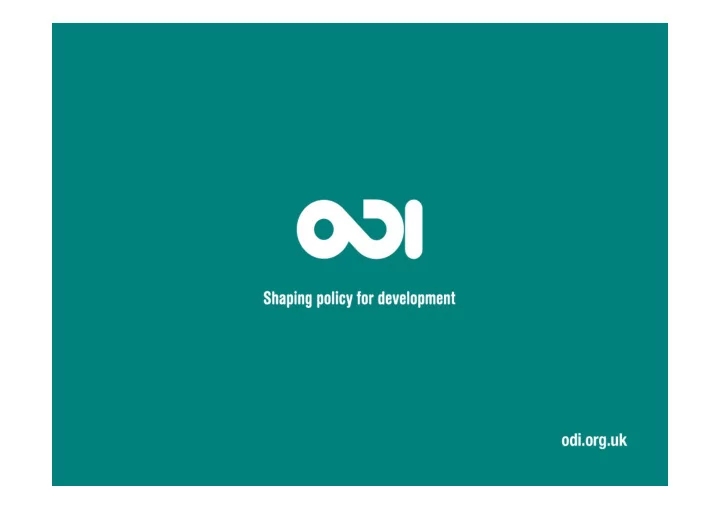

Why do donors delegate to multilaterals? A synthesis of six case studies Romilly Greenhill, Team Leader Development Finance 24 March 2016
Background • Commissioned and funded by DFID - but ODI views • Not yet final – DFID senior management and country feedback still to be incorporated • Will be published after the UK’s Multilateral Aid Review 3 #hashtag
Key questions and approach Questions: • – What drives delegation, and how do we explain different levels of delegation among donor governments? What is the role of public opinion? – What factors determine which types of MOs donors are delegating to, and the kind of funding they delegate? Approach • – Focus on decision making ‘in practice’, and seeking to understand donors’ own perceptions 4
A case study based approach All data is for 2013. Source, OECD (2015) and Mello e Souza 2014
Patterns of delegation 6 Source: OECD (2015).
Supporting global public goods Donors state that supporting GPGs is a key rationale • for delegation Donors with a strong focus on GPGs appear to • delegate more core funding France: • – GPGs amongst 4 priorities in the 2011 Development Cooperation strategy – 2014 Rapport bisannuel by the MFA explicit on role of IFIs for GPGs – GPGs important for health 7
Donor ‘forum shopping’ Donors tend to delegate to multilaterals who share • their objectives, rather than complement them Alignment between sectoral/thematic priorities and • delegation is strong France: • – AfDB and IDA supported to reduce poverty and because of focus on Sub-Saharan Africa – GFATM and GAVI for health GPGs 8
Strategic and foreign policy concerns Place on international stage and foreign policy seen to • influence delegation decisions Delegation less of a technical process, more in • relation to foreign policy strategy 9
Path dependency is important Path dependency limits room for manoeuvre, • particularly in short term More important when aid budgets under pressure • France • – EU allocations decided on 7 year cycle – High levels of assessed contributions to the UN – Genuine discretion over a small proportion of funding The way decisions are made, and the role of politics is • also important 10
Influence is less significant Theory would suggest influence is a strong driver of • delegation Some relationship between influence and delegation in • France – Strong influence in GFATM, and high delegation – Influence in UN lower in relation to country size, and lower delegation – However, interviewees stated influence less important than other drivers No clear pattern across all case studies • 11
IDA: no clear relationship between contribution and voting share 12
Advantages and disadvantages are not a significant driver All donors list advantages and disadvantages of • multilaterals Evidence base varies, and use of MOPAN is mixed • Information appears to have limited impact on • delegation decisions France • – Interviewees reported that evaluations not substantially influencing allocation decisions This common across countries, even where more • formal assessments in place 13
Public and parliamentary opinion rarely important Limited general knowledge on multilaterals • – GFATM key exception, including in France No clear finding on the importance of ‘flag planting’ or • minimising donor risk Role of elected representatives varies • – Congress important in the US – Parliament in Norway quite active 14
Conclusions Supporting GPGs is a key rationale • Donors ‘forum shop’ • Strategic and foreign policy concerns important • Strong ‘path dependency’ • Influence: no clear pattern overall • Advantages/disadvantages less significant • Public and parliamentary opinion is rarely important • 15
ODI is the UK’s leading independent think tank on international development and humanitarian issues. We aim to inspire and inform policy and practice to reduce poverty by locking together high-quality applied research and practical policy advice. The views presented here are those of the speaker, and do not necessarily represent the views of ODI or our partners. Overseas Development Institute 203 Blackfriars Road, London, SE1 8NJ T: +44 207 9220 300 www.odi.org.uk r.greenhill@odi.org.uk
Recommend
More recommend